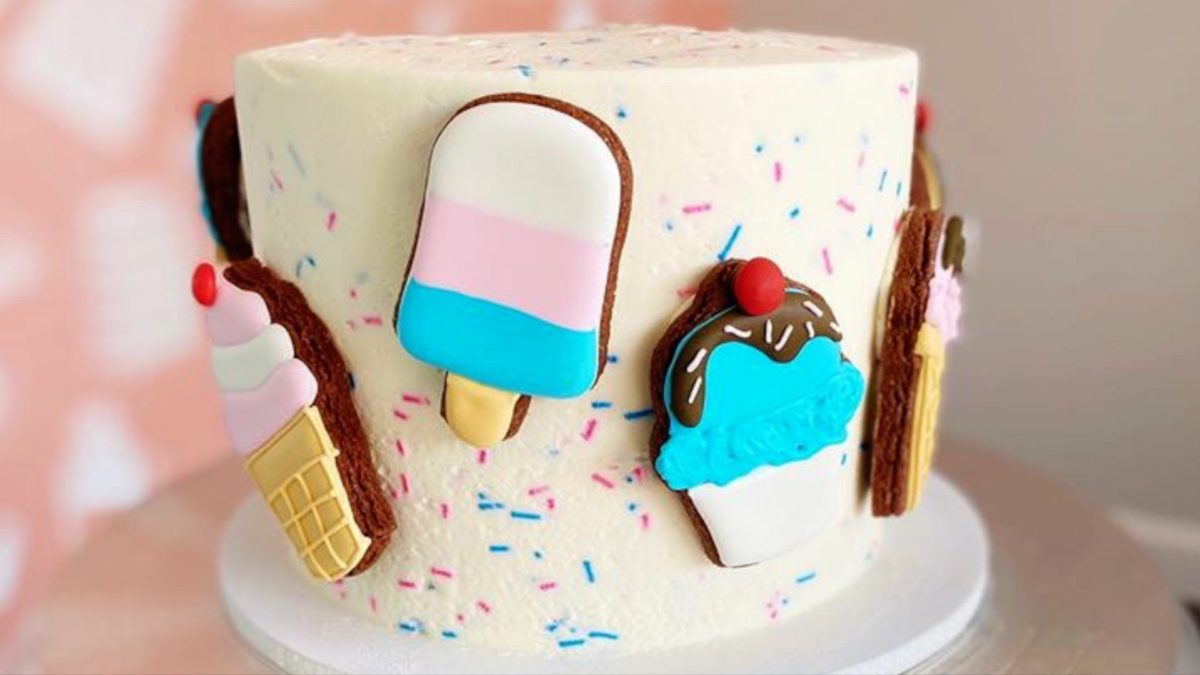
In this tutorial I’ll share an exclusive glimpse of professional cookie decorating behind the scenes in Sweet Spot Studio, where I met and shadowed an expert cookie decorator. I’ll show you the step by step process for decorating cookies (including Chef Jossie’s three tricks for perfect piping) and then demonstrate how to use cookies to decorate a cake. I’ll finish with my attempts at cookie decorating and some bloopers. If you prefer to watch a video of this tutorial, scroll to the bottom of the page.
On a cross-country hunt I found a professional cookie decorator who was willing to share her secrets on how to create her gorgeous cookies.

I spent an evening with Chef Jossie at Sweet Spot Studio in Charlotte in North Carolina learning all about how she decorates cookies with eye-catching colours, textures, and intricate details, which I’m now going to share with you!

To decorate cookies you’ll need cookies, of course, and royal icing, which you can buy or make yourself. When you’re not using it, cover it with a damp towel to stop it from drying out.
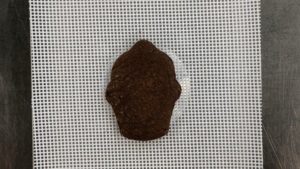
Tint small amounts with gel colours to use in piping bags next, and you’ll need a stiff and loose consistency of each colour for different parts of the cookies.
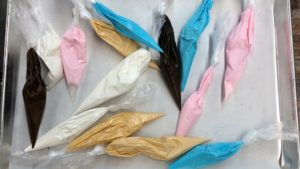
Start by outlining each colour of your design, using the piping bag with the thicker consistency of that colour of royal icing.
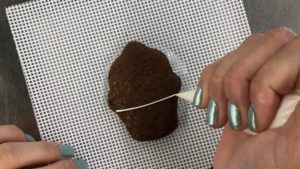
There are three tricks for outlining your cookies. The first two go together and they’re speed and pressure. When you find the right combination of the speed you move your piping bag and the pressure you squeeze your bag with, you’ll pipe a perfectly straight line.
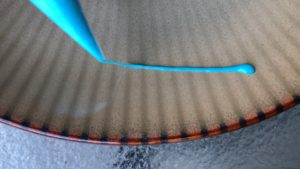
If you move your bag too slowly or apply too much pressure to the bag, the icing will wiggle as you pipe and your line will be more of a zig zag, like the top line here.
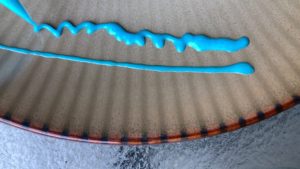
If you move your bag too fast or don’t apply enough pressure to the bag, the icing won’t be able to keep up with you and your line will break, like the bottom line here.
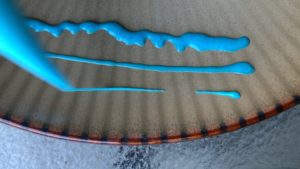
The bigger the hole you cut in your piping bag, the faster you’ll have to move your bag and the less pressure you’ll need to apply compared to if you cut a small hole, and then you’ll need less pressure and can move the bag more slowly. So for the most control as you pipe, a small hole is easiest.
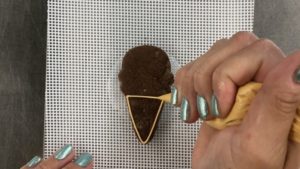
The third trick is the height that you hold the piping bag above the cookie. When you’re first learning, it feels natural to hold the bag just above the cookie and you’d imagine that your piping would be best when you’re close to the target.
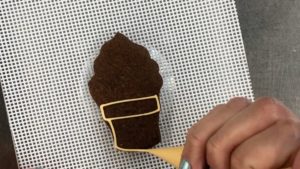
But actually, you have the most control when your piping bag is higher up, and when you’re directing the royal icing from a bit of a distance you’ll get much neater, more accurate lines.
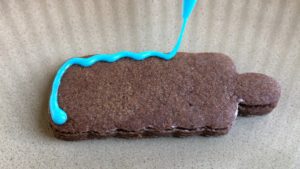
None of this matters if the consistency of your royal icing is too thin or too thick. If it’s too thick, your line will break as you’re piping and you’ll leave visible texture in your lines. If it’s too thin, it will spread out as you pipe so your line won’t be as sharp and any angles or curves will bleed into each other and might even slide off the side of the cookie.
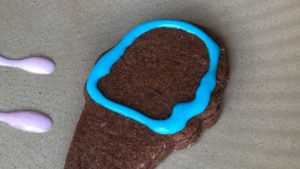
When you’re outlining your cookies you need to outline every coloured section, so for this cookie there’s the beige coloured ice cream cone, this first layer of white ice cream and then some pink ice cream and then more white on the top.
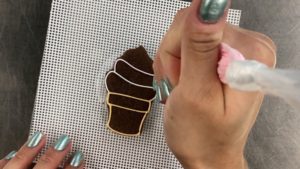
These little cookie turntables are amazing by the way, but they’re definitely not essential. You can decorate on any flat surface, it’s just convenient being able to spin the cookie around like this. To buy a cookie
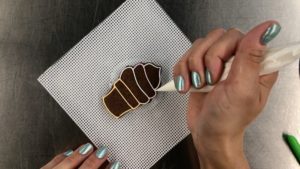
Immediately after outlining all of the coloured sections of the cookie, it’s time to flood them. Flooding is just filling in an outline with royal icing of a looser consistency, so as you squeeze it out of the piping bag it spreads out to cover the cookie all the way up to the outline.
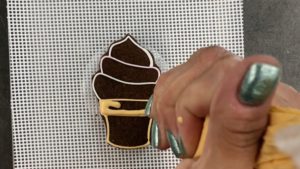
You can use a pin like this, called a cookie scribe, to push the icing all the way to the outline and also to pop any air bubbles in the icing.
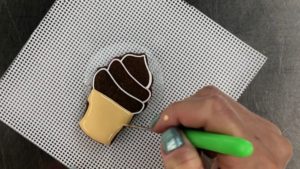
For sections of colour next to each other, you can either flood them straight after each other or you can wait for the first section to dry before you flood the next section. If you flood coloured sections next to each other so different colours of wet royal icing are touching each other, the colours will blur together where they meet instead of having a clear cut line.
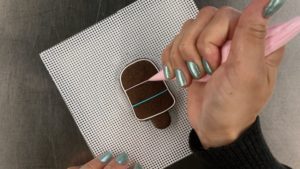
That might be the effect you want, like for this popsicle where the colours don’t have a distinct division between them, it’s kind of blurry, because the pink and white and blue royal icing touched each other while it was still wet so the join is fluid.
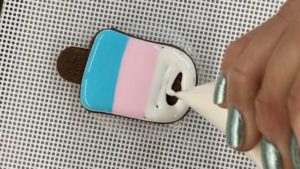
The other option is to flood areas that aren’t touching each other and then let those dry before continuing. Royal icing takes several hours on its own to dry but you can speed up the process by putting the cookies in front of a fan or they’ll dry even faster in a dehydrator.
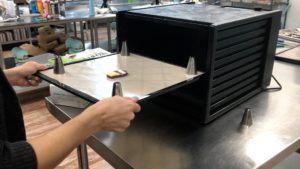
For this ice cream cookie, the beige cone and the pink section of ice cream were flooded first. The sections in between were left out so that no wet icing sections touched each other. After flooding these two sections, the cookies was dried in a dehydrator for about 5 minutes to set those colours of icing.
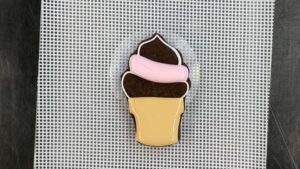
Then when white icing floods the adjacent section it goes right up to the edge of the pink icing but because the pink icing is dry and hard, the join between them is clear and solid, so the pink and white are separate sections of colour with distinct boundaries.
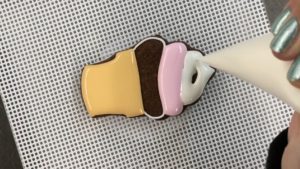
Compare the pink and white and blue popsicle cookie (where different colours of icing were piped side by side without drying in between) to the pink and white ice cream cookie (where wet icing was piped next to dry icing).
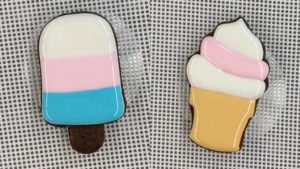
After drying the first round of flooding there are several techniques you can use for the next round of icing; flooding, adding detail lines, adding texture, layering shapes, and attaching decorations.
Flooding
You can use royal icing with a thin consistency to flood more areas, filling in other colour sections, like the stick on this popsicle. By drying the rest of the icing first, the division between the stick and the popsicle will be more distinct than if you’d piped the stick right next to the blue icing while it was still wet.
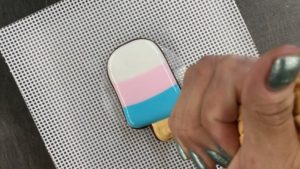
Add detail lines
Now that the sections you flooded first have dried and hardened, you can add detail lines like making the waffle texture on this cone, and the piping will sit on top of the layer of icing that’s dry.
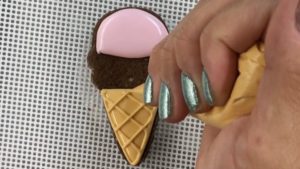
You’ll need a stiff consistency of icing for this, the same stiffness as you used to outline. If you had piped these details on before letting the first layer dry, the details would sink into the wet base layer of icing.
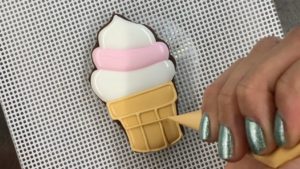
Add texture
Using a stiff consistency of icing, the same as you’d use for outlining shapes, add texture to cookies. For example, these squiggly circles are holding their shape after being piped.
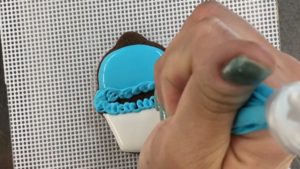
This texture is great for the rough part at the bottom of a scoop of ice cream. To make it look less neat you can smudge the lines by scratching them with a cookie scribe.
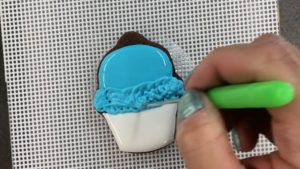
The same technique works well for the texture at the top of an ice cream cone, using zig zag lines instead of circular loops. If you used thinner icing, like you’d use for flooding shapes, the icing would sink down and spread out and lose its texture.
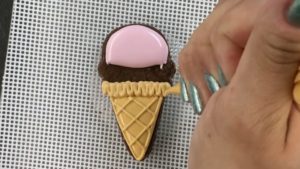
Layer shapes
By outlining another section of colour over one of the first sections of colour, and then filling it in. This is going to look like chocolate syrup on top of the pink ice cream. By piping this on top of another colour which has already dried, you’re adding thickness to the icing, which adds dimension and it really looks like syrup poured on top of the ice cream.
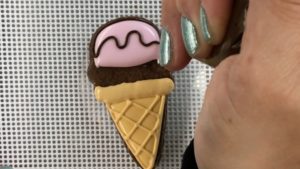
This icing is a combination of the stiffer icing used for outlining and the thinner icing using for flooding, so the consistency is somewhere in the middle and it works for outlining this syrup and also flooding it.
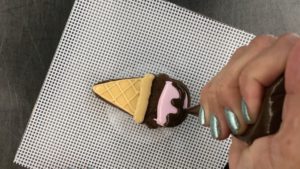
You can do this with all sorts of shapes, like these little lines for sprinkles. If you piped these onto wet icing, they would sink into the icing instead of sitting on top of it.
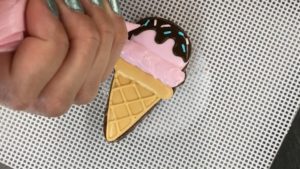
Attach decorations
You can use icing as glue to attach sprinkles to your cookies. After an area of icing has dried, pipe a little dot of icing with a stiff consistency and then press a sprinkle onto it. As the dot of icing dries, it will secure the sprinkle in place.
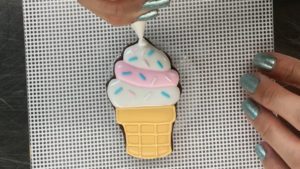
You could press the sprinkle into the base layer of icing on the cookie while it’s still wet, so that the sprinkle sticks onto it and you wouldn’t need to add the dot of icing as glue, but the pressure you use as you push the sprinkle in can make the layer of icing bulge.
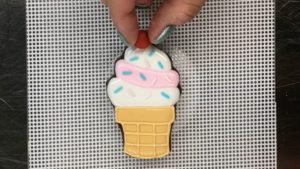
By doing it this way, with a dot of icing as glue, you have more control because you can adjust the sprinkle after pressing it into the dot, shifting it a bit lower or higher before the dot dries and sets the sprinkle in place.
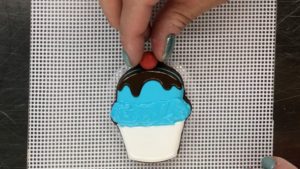
When you finish decorating your cookies, place them in front of a fan to dry completely. The time it takes depends on the humidity but it’s usually a few hours.
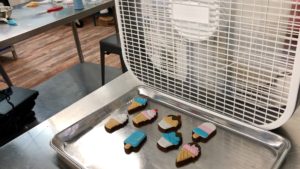
Now I’ll show you a way to use cookies to decorate a cake! While our cookies were drying, I made the most of being in such a beautiful studio kitchen and with this gorgeous mixer I made a batch of my 4 Minute Buttercream frosting.
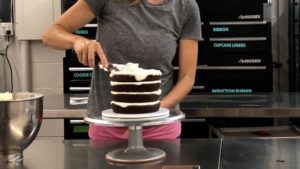
I’m going to place cookies around the sides of the cake after frosting it. To do this, assemble your cake and apply a crumb coat, which is a thin layer of frosting to trap in any crumbs that might come off the cake so they don’t get into the final coat of frosting.
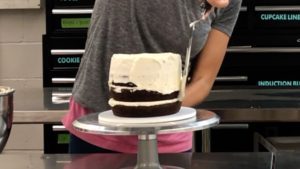
For my final coat I’m going to put sprinkles in the frosting, and after perusing the extensive sprinkle collection in the studio I’m choosing these simple pink and blue jimmies, which I’m pouring into the buttercream and then spreading onto the cake.
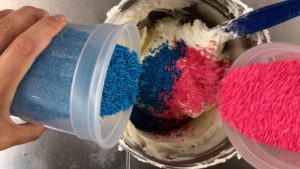
You can press cookies straight into the frosting while it’s still soft and sticky but that can make the frosting bulge around the sides of the cookies. Alternatively, you can chill the frosting to let it set and then use a little bit of plain buttercream to attach the cookies.
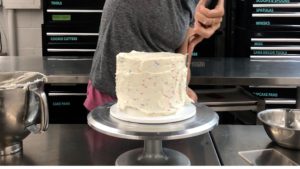
You can do this by spreading a bit onto the back of a cookie and then pressing it against the frosting, and that little bit of buttercream will set and secure the cookie against the side of the cake.
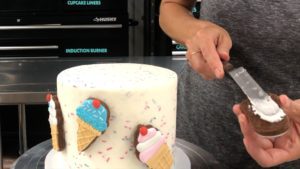
Or you can put the buttercream in a piping bag and pipe it onto the back of the cookie.
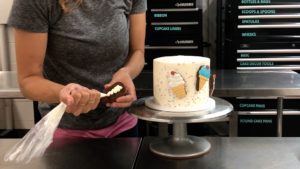
Chef Jossie gave me some cookies and piping bags of royal icing to take home with me, like you’d get if you had a subscription to Sweet Spot’s online cookie decorating classes.
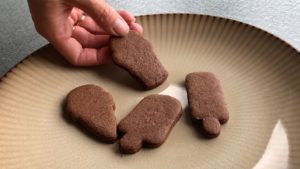
The colours separated in the bags, like she told me they would, but you can squeeze and massage them for a while to get them back to normal. I had bags of thinner and thicker consistency for the different styles of piping and some cute little cookies ready to be decorated.
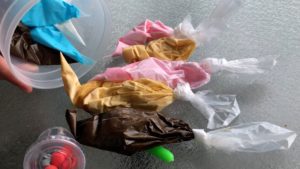
I’d love to tell you that my first attempt at cookies ended up being just as beautiful as hers, but I quickly gave up and gazed out at the pretty view instead. I think I’ll stick to cakes for the moment!
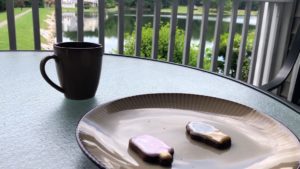
I hope these tips have been useful!
If you’re looking for creative ways to use your cookie cutters, check out my tutorial on 6 Ideas for Cake Decorating with Cookie Cutters.
Here’s the video version of this tutorial:
